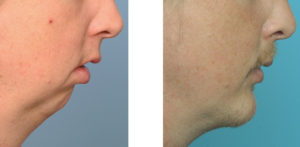
Despite the fact that a chin implant and the incision through which it is placed is small, it will definitely make the chin sore after surgery. This is because it is necessary to lift the chin muscle (mentalis) off of the bone to position the implant in place. The soreness will go away in a week or so as the muscle pain settles down but the chin will feel stiff for awhile. One may also notice some unusual muscle movements or ‘spasms’ as the chin muscle heals over the implant. This is the result of the muscle adapting to being stretched over the size of the implant.
Some moderate swelling of the chin is to be expected for a few weeks but bruising is rarely seen. If bruising occurs, it is mild and usually appears below the chin in the neck.
There almost always is some numbness after the chin implant procedure. The skin over the chin, and sometimes part of the lower lip, may feel numb for awhile after surgery. This occurs because the small branches of the mental nerve, which supplies feeling to the lower lip, front teeth, and chin, are stretched from the surgery. In some cases, the big end of this nerve where it comes out of the bone may be affected from placing the side wings of the chin implant. In either case, the feeling will return within a month after surgery.
Between the numbness and the muscle stretching in the chin, some patients will notice that their lower lip may appear or move a little differently after surgery. This effect can be disturbing but it is only temporary.
Dr. Barry Eppley
Indianapolis, Indiana


